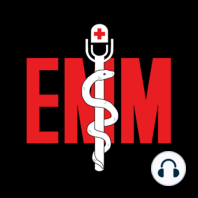3 min listen
Mental Health Monthly #17: Mania
ratings:
Length:
41 minutes
Released:
Oct 4, 2023
Format:
Podcast episode
Description
Contributors: Andrew White MD - Outpatient Psychiatrist; Fellowship Trained in Addiction Psychiatry; Denver Health Travis Barlock MD - Emergency Medicine Physician; Swedish Medical Center Summary In this episode of Mental Health Monthly, Dr. Travis Barlock hosts Dr. Andrew White to discuss the elements of mania that may be encountered in the emergency department. The discussion includes a helpful mnemonic to assess mania, work-up and treatment in the ED, underlying causes of mania, mental health holds, inpatient treatment, and the role of sleep in mania. Educational Pearls Initial assessment of suspected mania can be done via DIGFAST: Distractibility - Individual that is unable to carry a linear, goal-directed conversation Impulsivity - Executive functioning is impaired and patients are unable to control their behaviors Grandiosity - Elevated mood and sense of self to delusions of grandeur Flight of ideas - Usually described as racing thoughts Agitation - Increase in psychomotor activity; start several projects of which they have little previous knowledge Sleep decrease - Typically, manic episodes start with insomnia and can devolve into multiday sleeplessness Talkativeness - More talkative than usual with pressured speech and a tangential thought process Interviewing patients requires an understanding of mood-based mania vs. psychosis-based mania An individual with mood-based mania will more likely be restless, whereas a patient with psychosis-based mania will be more relaxed from a psychomotor standpoint Treatment of manic patients in the ED includes the use of antipsychotics to manage acute symptomatology Management can be informed and directed by the patient’s history i.e. known medications that have worked for the patient ED management of manic patients involves a work-up for a broad differential including agitated delirium, substance-induced mania, metabolic disorders, and autoimmune diseases. Some individuals experience manic episodes from marijuana and other illicit substances Antidepressants used in bipolar patients for suspected depression may induce mania Important to avoid using antidepressants as first-line therapy Mental health holds can be beneficial in patients with grave disabilities from mania Oftentimes, undertreatment of manic episodes leads to re-hospitalization Inpatient treatment: Environment is important - ensure that patients get solo rooms if possible to minimize stimulation Antipsychotics, including risperidone and olanzapine, with or without a benzodiazepine, are useful for short-term agitation Long-term treatment involves coupled pharmacological treatments with non-pharmacological treatments Sleep Fractured sleep is one of the earliest warning signs that someone has an imminent manic episode Poor sleep can be an inciting factor for mania, which then turns into a cycle that further propagates a patient’s manic episode Summarized and edited by Jorge Chalit, OMSII | Studio production by Jeffrey Olson, MS2
Released:
Oct 4, 2023
Format:
Podcast episode
Titles in the series (100)
Alexis St. Martin: Story of the unethical treatment of Alexis St. Martin to discover aspects of digestion. by Emergency Medical Minute
